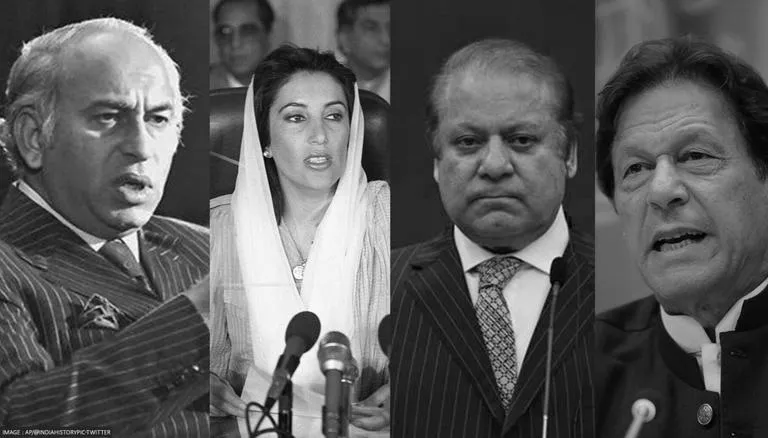Chaos in the neighbourhood continues. Imran Khan, the former Prime Minister of Pakistan and current leader of the Pakistan Tehreek-i-Insaf (PTI) party, was arrested on May 9 on corruption charges related to the Al Qadir University Trust. This is not the first time a former Prime Minister of Pakistan has been arrested. Pakistan’s history is fraught with political turmoil, and many of the country’s former prime ministers have found themselves behind bars at some point in their careers. From Zulfikar Ali Bhutto to Nawaz Sharif and beyond, these leaders have faced accusations of corruption, conspiracy, and other crimes. For many Pakistanis, the sight of their leaders being led away in handcuffs has become all too familiar.
A walk down memory lane
The timeline of former Pakistan prime ministers who have been arrested is a long one. One of the earliest examples of a Pakistani prime minister being incarcerated was Huseyn Shaheed Suhrawardy, who served as the fifth prime minister of Pakistan from September 1956 to October 1957. Suhrawardy refused to endorse General Ayub Khan’s seizure of government and was subsequently banned from politics under the Elective Bodies Disqualification Order (Ebdo). Later, in July 1960, he was accused of violating the Ebdo and arrested on charges of “anti-state activities” under the 1952 Security of Pakistan Act. In January 1962, he was put in solitary confinement in the Central Jail of Karachi without trial.
Zulfikar Ali Bhutto, who served as prime minister from August 1973 to July 1977, was another high-profile figure to be incarcerated. In September 1977, he was arrested for conspiring to murder a political opponent in 1974. He was released by Lahore High Court Justice Khwaja Mohammad Ahmad Samdani, who stated that his arrest had no legal grounds. However, Bhutto was arrested again three days later under Martial Law Regulation 12, which empowered law enforcement agencies to arrest anyone working against security, law and order, or the smooth running of martial law. This law could not be challenged in any court of law. Bhutto was eventually sentenced to death and executed on April 4, 1979.
Benazir Bhutto, who served as Pakistan’s prime minister twice, from December 1988 to August 1990 and from October 1993 to November 1996, also faced several arrests throughout her political career. During Zia-ul Haq’s dictatorship from 1977 to 1988, Bhutto served as an opposition leader. In August 1985, she arrived in Pakistan for her brother’s funeral and was put under house arrest for 90 days. The following year, in August 1986, she was arrested for denouncing the government at a rally in Karachi on Independence Day.
In the 1990s, Bhutto faced several arrest warrants. In May 1998, the Ehtesab Bench of the Lahore High Court issued bailable arrest warrants for her. The Public Accounts Committee issued an arrest warrant against her in June 1998, and the Ehtesab Bench issued a non-bailable arrest warrant against her in July 1998. In April 1999, Bhutto was sentenced to five years and disqualified from holding public office by the Ehtesab Bench on charges of taking kickbacks from a Swiss company hired to fight customs fraud. She was not in the country at the time of the verdict, and the conviction was later overturned by a higher court. In October 1999, the Ehtesab Bench re-issued non-bailable arrest warrants for Bhutto due to her non-appearance before the court in the assets reference case.
Nawaz Sharif, who served as the prime minister of Pakistan three times (November 1990 to July 1993, February 1997 to October 1999, and June 2013 to July 2017), was also arrested and exiled to Saudi Arabia by Gen Pervez Musharraf in 1999. On his return to Islamabad in September 2007, he was arrested within hours of his arrival and sent back to Jeddah to complete the three remaining years of his exile. Sharif was also arrested and given a 10-year sentence for corruption by the National Accountability Bureau (NAB) in July 2018, along with his daughter Maryam Nawaz. He was released two months later when the court suspended the sentences to wait for a final judgment by the high court. However, in December 2018, he was jailed again and given a seven-year sentence in relation to his family’s ownership of steel mills in Saudi Arabia.
Shahid Khaqan Abbasi, who served as the Prime Minister of Pakistan from January 2017 to May 2018, was arrested in July 2019 for alleged corruption while awarding a multi-billion rupee import contract for LNG in 2013 when he was the Minister for Petroleum and Natural Resources.The current Prime Minister of Pakistan, Shehbaz Sharif, was arrested in September 2020 after the Lahore High Court rejected his bail in a money laundering case. He was released nearly seven months later from Lahore’s Kot Lakhpat central jail.
Imran Khan’s arrest on corruption charges marks another chapter in Pakistan’s history of imprisoning former prime ministers.

